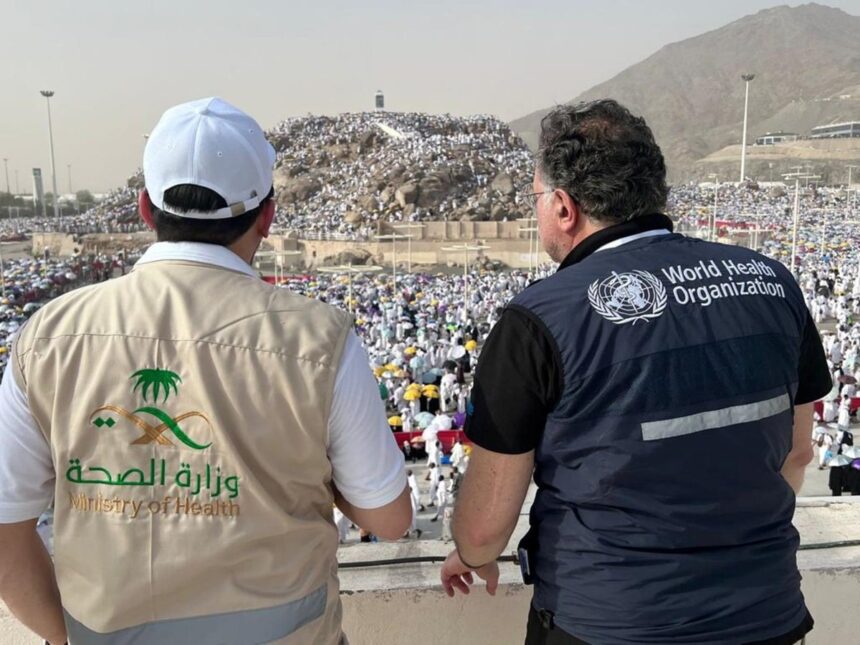“`html
The World Health Organization (WHO) and the Kingdom of Saudi Arabia have unveiled a significant digital health partnership aimed at enhancing the Hajj health card initiative, which serves approximately 3 million pilgrims participating in this sacred journey each year.
The Hajj health card utilizes the WHO Global Digital Health Certification Network’s public key infrastructure to compile essential health data, including medication requirements, allergies, vaccination history, and pre-existing medical conditions. This card empowers travelers by granting them control over their personal health information while in Saudi Arabia. It allows them to share accurate and current patient summaries with authorized healthcare providers to receive tailored quality care.
“This is a remarkable step forward in WHO’s commitment to assist Member States in providing safer and more personalized digital health solutions that enhance access to quality healthcare whenever it is needed,” stated Dr. Jeremy Farrar, WHO Chief Scientist. “We appreciate the strong collaboration with the Kingdom of Saudi Arabia, participating nations, and the WHO Regional Office for the Eastern Mediterranean. We look forward to further strengthening capacity-building efforts as countries transition towards more digitized healthcare systems.”
The Hajj pilgrimage stands as one of the largest religious gatherings globally, attracting nearly 3 million participants from over 180 nations annually. In 2024 alone, more than 250,000 pilgrims from Indonesia, Malaysia, and Oman received Hajj health cards during a pilot program initiated by WHO in partnership with Saudi Arabia. This trial phase successfully demonstrated that each nation could implement global standards for issuing their own versions of these cards—ultimately enhancing safety and care quality for pilgrims during their spiritual journey.
In light of this success, WHO and Saudi Arabia have committed to further collaboration aimed at refining and expanding upon this effective pilot program for the Hajj health card initiative. The expertise provided by the Saudi government alongside its digital partner LEAN will bolster data security measures while offering vital technical support as additional countries join this program.
“This innovative alliance between the Kingdom of Saudi Arabia and WHO aims to broaden access to safe pilgrimage experiences through enhanced use of digital tools,” remarked Dr. Hanan Balkhy, Regional Director for EMRO at WHO. “By harnessing digital healthcare solutions effectively we can improve care quality while fortifying healthcare systems across both Eastern Mediterranean Region countries as well as globally.”
A Growing Network: Over Eighty Countries Join Digital Health Certification
In 2023,WHO launched its Global Digital Health Certification Network (GDHCN), building on successful collaborations with entities like the European Union regarding COVID-19 vaccination certificates. Currently comprising over eighty Member States that have developed systems capable of verifying authentic health information among themselves using an international standard known as IPS – International Patient Summary.
This network operates on a secure public key infrastructure (PKI) encryption system designed to ensure that all credentials remain verifiable without compromising individual privacy rights; thus allowing national authorities along with healthcare providers confidence when validating documents across borders.
The overarching goal is establishing a future where individuals possess internationally recognized medical credentials facilitating improved travel experiences alongside better access points within various healthcare settings worldwide—empowering people through greater control over what personal information they choose share when seeking treatment domestically or abroad.
Countries joining this certification network can streamline administrative processes significantly; thereby enhancing border control efficiency while ensuring informed medical visits take place seamlessly throughout different regions around our globe! This global framework lays down foundational improvements necessary for ongoing international cooperation concerning future applications such cross-border e-prescriptions insurance claims even telemedicine services!
Source
“`





